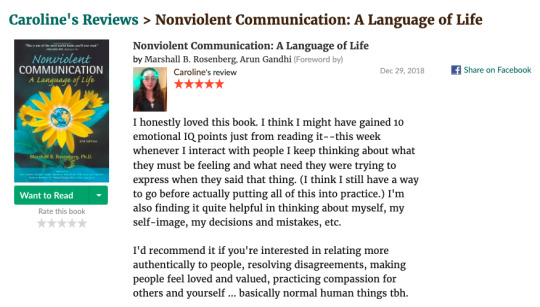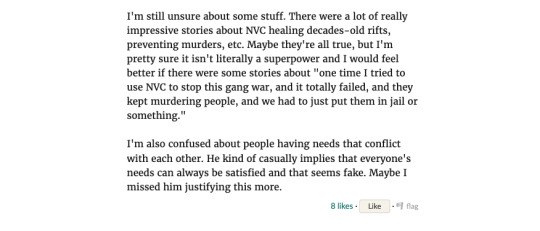#NVC
Explore tagged Tumblr posts
Text
Okay guys I have something!!! My video game Nightview city (see previous posts if you click on my account) is gonna do a contest to see who can make the best game poster.
This contest is open to ANYONE!! Just play the game and make a poster :)
We’ll be waiting
Btw- if you win this, the poster will be used at a national level to gain support for the game
6 notes
·
View notes
Text
“According to Marshall Rosenberg, "no conflict exists at the level of human needs" because all humans share the same fundamental needs, and conflict only arises when people clash over the different strategies they use to meet those needs.”
~ Google’s AI on Nonviolent Communication

#communication#healthy communication#nonviolent communication#nvc#marshall rosenberg#compassionate communication#needs based communication#noncontroversial essence
3 notes
·
View notes
Text
I bought an amazing LCD writing tablet on wish and I can only recommend it.
It's fun and a great tool, especially for nvc!!
As a person that goes semi-verbal, not only when regressed, this has helped me greatly!!
I bought the smallest size for 4€ the biggest costs 12,50€
.゚.*・。゚×゚。・».゚°・✧ ↓ DNI ↓ ✧・° ゚.«・。゚×゚。・*.゚.

#nates recommendations#nates recs#sfw interaction only#sfw#non verbal communication#nvc#semi verbal#sfw agere
20 notes
·
View notes
Text
Identity politics would really benefit from nonviolent communication
0 notes
Text

هل تعاني من سوء الفهم أو النزاعات المتكررة في علاقاتك؟ 😥 قد تكون طريقة تواصلك هي السبب! "التواصل اللاعنفي" (NVC) لمارشال روزنبرغ يقدم نموذجًا بسيطًا وقويًا للتعبير عن نفسك بصدق وفهم الآخرين بعمق. يعتمد على 4 خطوات: الملاحظة، الشعور، الحاجة، الطلب. تعلم كيف تحول محادثاتك من اللوم والدفاع إلى #التعاطف والتفاهم. اكتشف لغة الحياة 👇 https://nuvatra.blogspot.com/
#NonviolentCommunication#NVC#MarshallRosenberg#Empathy#CommunicationSkills#Relationships#ConflictResolution#Nuvatra
0 notes
Text
Trying to get better at guessing peoples feelings and needs. Sharing in case it helps anyone

Empathetic reflections rather than assumptions. Phrase in a way that invites people to confirm or clarify
2 notes
·
View notes
Text
Free book: "How to Stop Hurting the Ones We Love" – A book that can change your life

Adrian Carter's book is a true balm for souls wounded by misunderstandings and conflicts in personal and professional relationships. It helps us become calmer and more appreciated in a society that values collaboration, positivity, and tolerance.
Simplicity in Reading
The author succeeds in conveying valuable ideas in an accessible language. He avoids psychological and technical jargon that might intimidate and confuse the average reader. Carter does not offer superficial solutions for suppressing anger or managing conflicts. Instead, he helps readers understand their emotions and eliminate the frustrations that underpin aggressive communication. This approach is truly groundbreaking.
Empathy: The Key to Harmonious Relationships
Empathy is a central pillar of this book. The author encourages readers to put themselves in others' shoes, emphasizing that understanding the emotions of those around us is essential for building serene relationships. Through practical examples and inspirational stories, he demonstrates how a lack of empathy can lead to conflict and suffering, while cultivating empathy fosters deeper connections, tranquility, and peace.
The chapters are well-structured, with each idea supported by real-life examples. This makes the principles easy to understand and apply. Carter also explores how recognizing and managing our own emotions helps us treat others with kindness and understanding. His lessons are illustrated through authentic stories that add extra depth and meaning to the text.
The Lizard Metaphor
One of the book's most memorable elements is the metaphor of "being loved like a lizard." This image captures readers' imaginations, turning an abstract concept into a tangible lesson. The metaphor illustrates the beauty of pure, simple relationships, where criticism and judgment are set aside, and love and acceptance take center stage.
A Must-Read for Anyone Who Wants to Improve Their Relationships
How to Stop Hurting the Ones We Love is more than a book about communication; it is a journey toward becoming a better version of ourselves. With profound insights into love, empathy, and acceptance, this book serves as a valuable guide for anyone seeking to build relationships based on respect and harmony.
Recommendation: This book is perfect for those who want to become better partners, parents, or friends, as well as for anyone seeking to understand the complexity of human relationships from a unique perspective. It is an essential read for anyone who wants to leave a beautiful and lasting mark on the lives of those around them and be more serene and valued by the society and their dear ones.
FREE on Google Play and Apple Store. Check the links below.
EBOOK on Android devices https://play.google.com/store/books/details?id=xMoeEQAAQBAJ
EBOOK on Apple devices https://books.apple.com/book/id6670409523
AUDIOBOOK on android devices https://play.google.com/store/audiobooks/details?id=AQAAAECyug76rM
PAID PHYSICAL BOOK in UK https://www.amazon.co.uk/dp/B0DFT3LZDD
PAID PHYSICAL BOOK globally https://relationshipflorist.com/shop
#family#divorce#relationships#relationship#breakup#feelings#self development#self love#sad thoughts#self improvement#self worth#self discovery#self care#love#romantic#books and reading#books#reading#empathy#psychology#acceptance#tolerance#nvc#communication#kindness#compassion#be kind#positivity#freebies#google books
0 notes
Text
I’m choosing to learn. I have seen much more suffering than I believe is necessary in our world.
Marshall Rosenberg’s nonviolent communication is enlightening. It’s a shift in a different direction. It offers a comprehensive, alternative perspective.
Will I do this exercise? Probably… eventually. I’d like to. There’s much discouragement from a “different way of thinking” all around me.
youtube
#nvc#nonviolence is possible#nonviolent communication#marshall rosenberg#compassionate communication#Youtube
0 notes
Text
わかりやすい。NVC.
“北村さんが高校生に講演した際「いらいらしたこと」を問うたら女子高生が自嘲して「彼氏にヤリ逃げされた」とみんなの前で言った。北村さんは「どんな気持ち?」とたたみかけた。彼女は「むかつく→二股だった→悔しい→悲しい」ときて、最後「大切にしてほしかった」と泣いた。自分でも驚いたという。 北村さんは「怒りやいらいらは2次感情」と言う。「その怒りの奥底には”わたしを認めて、大切にして、肯定して”という柔らかな1次感情がある」。言葉にできないからこそ暴力に発展する。誰が子どもの奥底の小さな悲しい声を聞くのか。親が、子どもの悲しさや弱さを受け止めないと、行き場がなくなる”
—
Twitter / Makiko Miyajima (via tsundere) (via shrineroof, clione)
2010-01-26
(via gkojay) (via neos21)
(via theemitter) (via yaruo)
4K notes
·
View notes
Text
Budapestért díjat kapott a fővárosban 20 éve technobulikat szervező NVC csapata
Budapestért díjat kapott a fővárosban 20 éve technobulikat szervező NVC csapata
A magyarországi underground zenei szféra formálásában részt vevő tagok időközben izgalmas éttermeket is nyitottak, létrehozták az egyre népszerűbb Turbina Kulturális Központot, továbbá az ő nevükhöz is fűződik a tavaly útjára indult INOTA Fesztivál. November 15-én pénteken vehette át az NVC szervezőcsapat a Budapestért díjat, amit a Fővárosi Önkormányzat a bármely területen végzett kiemelkedő…
0 notes
Text
Use Non Violent Communication to speak your truth and establish boundaries to protect your well-being and meet your needs.
When we try to shield someone from their pain, we take away their opportunity to discover their power. But when we truly heal and take care of our own issues, that’s when we are able to love others more deeply.
It’s important to learn to be in deep and emotionally intimate relationships with other human beings, without taking responsibility for anyone else’s feelings or pain. So often in a relationship one does not speak the truth, is fearful of being real, hides true feelings, and may try to control the relationship in many subtle ways in the name of care, protection, and love.
Having intimacy without responsibility for others is about practicing the art and skill of freedom in a relationship and moving toward more love and care for self. We realize that when we truly heal and take care of ALL of our own issues, we are able to love others more deeply.
Any issue or pain not resolved with our parents can be reenacted in later adult relationships: unresolved old wounds or trauma. Our partners will activate and trigger our original family imprints.
It is not one’s responsibility to take care of, protect, enable, force outcomes, control, manipulate, or take care of someone else’s feelings. Yes, it is beautiful to love someone and care deeply about how they feel, yet it is not healthy to stop them from feeling life experiences or manipulate the environment to control what goes on.
Sometimes, caretaking and feeling responsible for someone else becomes a distraction from self — from one’s own pain and inner life. Walking on eggshells around a partner, family member, colleague, etc. is another way one may attempt to control someone else’s feelings for fear of some kind of reaction from the other, such as anger, rage, or even depression and sadness.
It is healthy for one’s body, mind, and soul to be able to speak your truth, be honest despite fear, and take responsibility for yourself only.
When I try to shield you from your pain or hurt feelings, I take away your opportunity to discover your own personal power. When I shield my loved one from pain or hurt, I am taking away their opportunity to discover their greatness, often from the natural consequences that can be utilized for growth, where they find their strength.
By making a clear request of what I want, I give attention to what I want in my relationships, rather than focusing on what I do not want. Whatever I give my attention to grows.
By discovering your own truth and values — by looking deeply at your feelings and the needs they’re telling you about — you learn the importance of accepting yourself. Then, with this clearer perspective, you can accept and love others, too, from a place of balance and abundance.
Often, when stressed, we tend to grasp onto control strategies with even more intensity. We do the time-honored maneuver to avoid uncomfortable feelings. When things seem overwhelming, we can convince ourselves that we’d feel better if only we could get things to move and bend more the way we wish they would, instead of turning toward our feelings and meeting our needs.
0 notes
Text
Row It Back | Weeknotes
The other week in my review of Day One app I said that I was a bit of an Automattic fan boy. This week I’m going to row that back.

View On WordPress
#alms race#automattic#dougald hine#jetpack#NVC#paul graham raven#phones#podcast#sam kriss#second life#steve jackson#tinyletter#Varg²™#Viola Spolin#writing
0 notes
Text
Ultraleftism
The term has value describing historical phenomenon. the washington socialist article mentions ultraleftism as a phenomenon caused by online interactions. These interactions also have a uniquely historical character even though it describes mostly a phenomenon that exists within the personal beliefs of individuals. The term can also be a good shorthand with cadre once we’ve discussed a view and…

View On WordPress
0 notes
Text
One from the Heart


Dear Caroline:
I finished your book recommendation yesterday. As it usually happens, it has grown on me, although I am still of two minds about it. Even though making a review is a judgmental act at its essence, Rosenberg will have to forgive me as I give my thoughts and evaluations about its contents.
On the plus side, I feel like this is a book with a strong kernel of truth in it, and one that I am going to try to apply in my relationships. Not much can go wrong from trying to be empathetic and generous to others - my own natural inclinations point in this way anyway, although it would never have occurred to me to go along this path of detecting emotion - formulating need and request, and of trying to read others so intently.
I can also guess (there's the thinking again!) about why you would it so likeable in spite of the woo wishy-washiness it conveys at times. At the core, the book is pretty utilitarian: avoid judgements, avoid anger at the breaking of moral rules, avoid categorizing.
Phrasing the good more in NVC language: when I read this book, I feel happy and moved because I have a need of giving and being given to from the heart, empathically.
But I also have some misgivings about it. Besides the lack of non-subjective evidence presented (this is, after all, a self help book, nor a scientific paper), I think my biggest gripe is similar to yours. My intuition is that NVC probably works very well at the individual and/or small group level (modulo developing lots of empathy and patience towards others, and making conversations like x10 longer) but it probably doesn't scale up well. Once you are in a complex community beyond some numbers threshold with different time constraints and opportunity costs for efficiency, there is just going to be a significant chunk of people who you can't reasonably expect to persuade and bring over to this within a realistic framework and time-constraint. One can't do without rules. Going even deeper, I feel like I do not share the axiomatic principles about human nature that Rosenberg is building his foundations on. My unscientific take would be something like this: yes, we have some predisposition to empathy and connection (we are a social animal after all), but that frequently conflicts with a deeper-rooted instinct for self-preservation and advancement, with the whole of human history being a dialectic of these two. Some people can be really disinterested in extinguishing the fires of the ego, but most won't until human nature experiences a substantial change.
While pondering on this I was reminded a little bit of Confucianism, which has some nice bits I enjoy. One of its core tenets is a belief in de, a sort of charismatic auctoritas that arises from being really morally virtuous and others consequently following you and behaving better in your company as a result. Confucianism's political utopia is for the most virtuous to rule, and ideally, for him or her to be able to skew all forms of coercion and potestas. In practice, though, even the most Confucians have had to rely heavily on some degree or other on the stick.
There are other things you mention in passing that I also think about, like the way its seems to exonerate wrongdoers (that's the deontologist speaking in me, but you yourself touched upon this. Some actions are so violent and traumatizing that you can't really expect me to avoid establishing a necessary link between action suffered and feeling. Rosenberg is too stoic for my taste). As for conflicts in needs, the implicit corollary for me is something like 'very subtly shaming the other until one of you is willing to empathize a bit more and accept putting one of the conflicting needs (his or hers) in the waiting line'. Or a trial by exhaustion. I am sure you could illustrate some of the book's limitations through economic and game theory ideas.
Still, I don't want to end on a sour note. I genuinely liked the book and am pondering about its message. I think it's at least partially right in its advice to avoid prejudgments and on trying to force people to do the right thing, and that we can really open up to others when we feel listened to. And a take I will try to implement is changing my language a bit in these letters I write to you. I fear sometimes I might have sounded judgmental and essentialist, even when I was trying to be complimentary to you. I'll end by trying to phrase myself better:
When I read your posts, I feel elated, because I feel a need to connect with interesting, valuable and unusual thoughts and ideas and the people (and their needs) behind them, and to grow and challenge my preconceptions. So I am really grateful to you, Caroline, for making it possible.
0 notes
Text
I think things like NVC (non violent communication) should be taught in schools. So many of us don't have the privilege of having access to these skills in our upbringing, yet they are essential and crucial to having healthy relationships, and relationships are an enormous part of the human experience
0 notes
